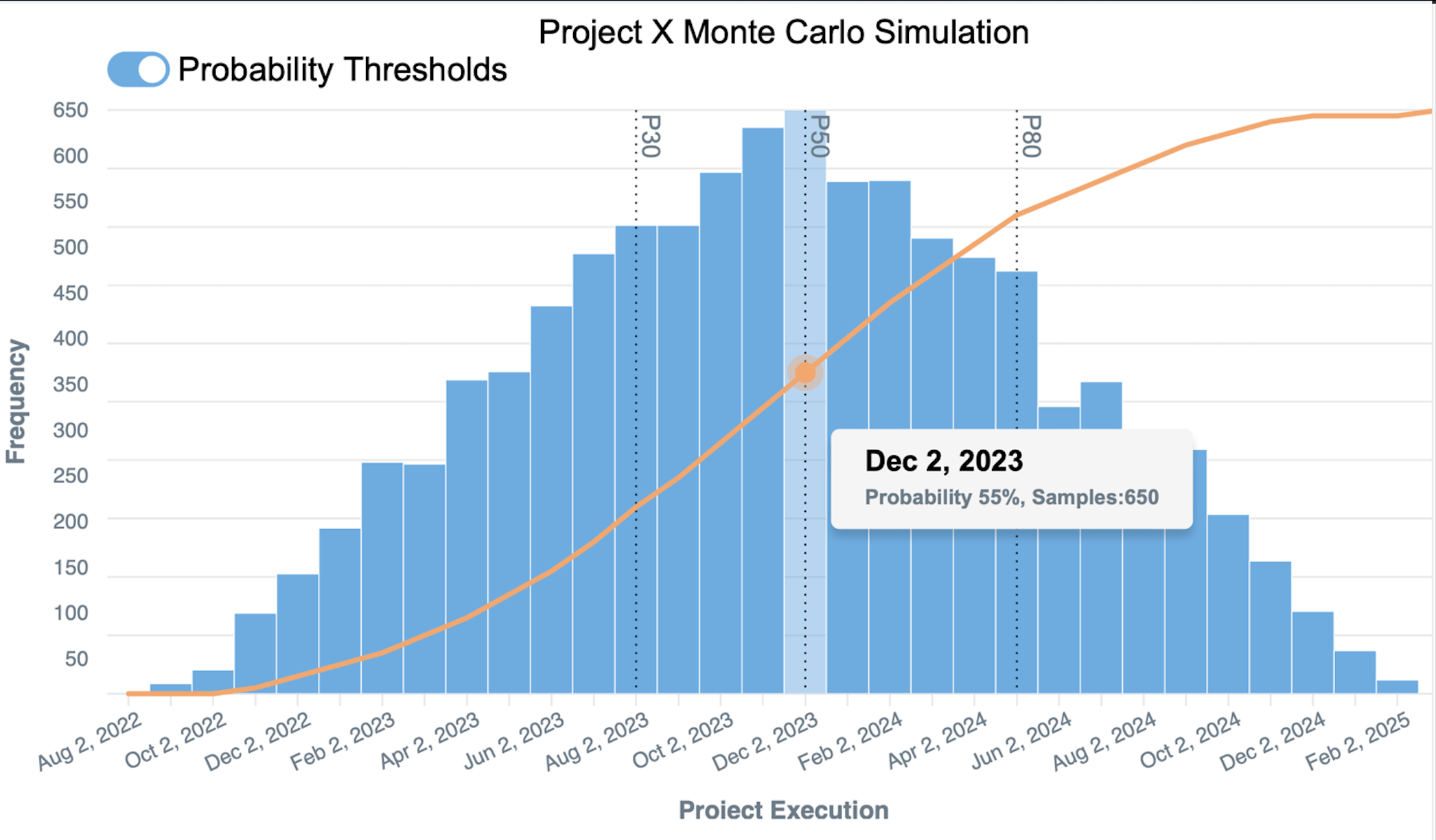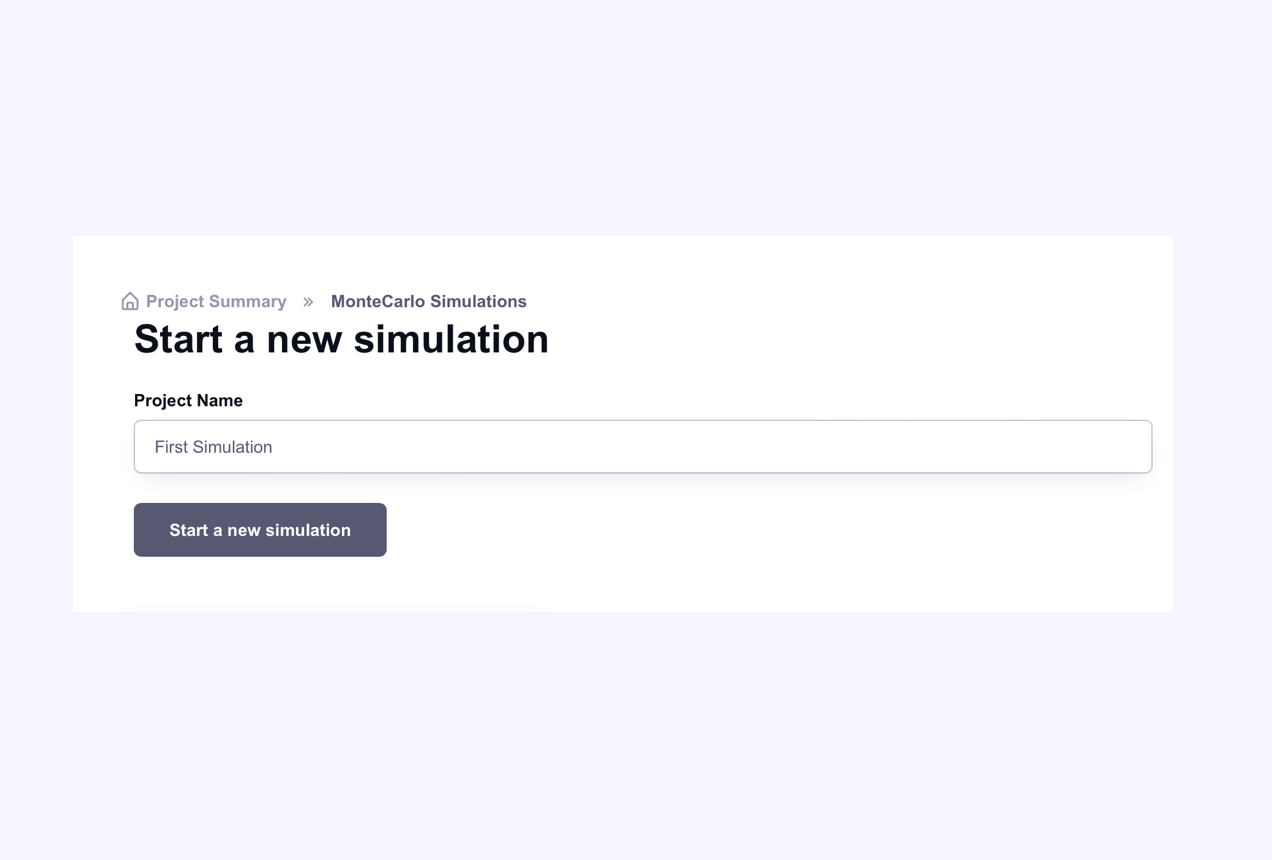Monte Carlo Simulations
Monte Carlo simulation provides a probabilistic analysis of a project schedule, helping project managers make the best decisions to keep work on track.
With our Monte Carlo simulation feature, you can run upto 10,000 scenarios for your project with a click of a button. Understand the probability of completion by a certain time period and provide
high confidence launch timelines to your leadership team or end customers.
What We Offer
Simplest way to run a complex project schedule simulation
Our monte carlo simulation runs with a single click; no messy setting up your mpp files in a certain format. No needing math degrees to input probability curves; no having to export and plot graphs yourself. No need to hire expensive consultants to accurately predict your commercial launch timelines!
Fast Results and easy to understand
Gain insights, look at the plot on the page (or play around with an actual chart at the bottom of the page). If someone asks you "Hey, we need Project X done by Oct 22', you can show them this and say there's a near 0 possibility. Dec 23' though has a 50% chance.
Best Case/Worst Case/Most likely
Our simulation engine can model using multiple distribution curves. The default triangular function uses all three durations for a highly accurate result. Uniform or normal/random probability distributions are also offered.
Attach Risks
Our software lets you add a risk (and its probability and impact) directly on a task; you can avoid messy redo loops or iterations. Simulations account for this risk and automatically includes it so you can be confident that your schedule outcomes are very realistic.

How does it work?
Create your schedule
Ensure that for all the tasks, you have the best case, most likely and worst case durations entered (or it'll use the project defaults).
Add in program risks
For any task, you can assign a risk with its probability and impact (example, say you developed a board, but board bring up fails and requires a new PCB to be ordered, instead of adding a redesign loop, you can model it as a risk).
Modify your project settings
Select the probability distribution settings (if needed) and the number of iterations (we support upto 10,000 executions of your project schedule).
Perform the simulation
When you run the simulation, our software takes your tasks, various durations, the risks involved and runs up to the selected scenarios. Once complete it plots the graph as shown on this page.
Easiest Monte Carlo Simulation you've ever tried
An alternative method for managing the risk in a project schedule is to create a probabilistic model of the project schedule, where activity durations are not described by unique values, but rather by probability distributions. Monte Carlo simulation is a process that generates random values for inputs that are processed through a mathematical model in order to generate multiple scenarios. The term “Monte Carlo” refers to games of chance, which are popular in Monte Carlo, Monaco. The distribution type (normal, exponential, uniform, etc.) is specified by the user and is based on the situation that is being modeled. In the case of a project schedule, a probability distribution is developed for each activity on the critical path and the mathematical model is the sum of all the activities on the critical path.
The plot shown is an example simulation result for a multi year medical device project. The output milestone was a 510k approval for the product, as you can see, this makes it very easy to visualize your program risk and assess probability of success for a certain time.

What are Monte Carlo Simulations for project schedules?
Monte Carlo simulation performs risk analysis by building models of possible results by substituting probability distributions for any factor that has inherent variability. It then calculates multiple results using a different set of random values from the probability distributions.
Do note however that our Monte Carlo does not take resources into consideration when running the (upto 10,000) project scenarios
- Monte Carlo simulations allow project managers to incorporate uncertainties and risks into their project plans, providing a more accurate and realistic view of the potential outcomes and completion date.
- Monte Carlo simulations can help overcome biases and inconsistencies in individual estimates by incorporating the inherent variability of task durations. This allows for a more objective and comprehensive analysis of project completion date, as it accounts for the potential impact of different scenarios and uncertainties on the project timeline.
- Monte Carlo simulations can help project managers identify the critical factors and risks that are driving the project completion date and prioritize their efforts on managing those factors to ensure project success.